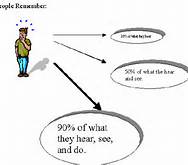
There’s a rather interesting story in the news about a school employee who stole some money over the course of seven years. Over that period she managed to steal an estimated $3 million by putting money in her bra as she was leaving school grounds.
The money came from students who paid cash for lunches over the course of the day. The employee was in charge of accounting for this money.
What I find interesting is that my first reaction, and that of most the people making comments, was that this was a huge amount of money to steal in seven years. That she must have had some specially made bra into which to stuff the huge wads of bills. Is that what you thought?
I heard the story as I was pulling up to pick up my dinner from a local grocery store and sat in my car for a few minutes before it occurred to me that maybe it wasn’t all that much to money to stuff into a bra after all. My math skills being deficient I waited until I returned home to perform the calculations.
The first order of business was to determine how many days are in a school year. It turns out there are about 180 on average so I went with that figure. So, let’s work it out.
The number of years = 7
The number of days = 180
The total amount = 3,000,000
The unknown amount is how much was stolen each day (x).
The equation: 7 * 180 * x = 3,000,000
7 * 180 = 1,260.
So now we have 1260 * x = 3,000,000. We move the 1260 to the other side of the equation and end up with this.
x = 3,000,000/1260.
The result is $2,380 per day.
Not so bad and it’s probably a good thing to get my algebra brain working again after all these years.
Now, let’s say it’s mostly $20 dollar bills, so that’s fairly simple. 2,380/20 = 119 bills stuffed into her bra on a daily average.
Our math isn’t done yet because I need to know how thick is a pile of 119 bills. Yes, I have a sickness, I admit it.
The US Treasury says that a dollar bill is .0043 inches tall.
Now we take 119 * .0043 and end up with .511 inches. Half an inch of bills every school day for seven years and we’ve got our answer! It can be done and without that much trouble.
Isn’t math great!
So, I was wrong and so were most of the people who made comments on the story.
Now, tell me the truth, when you first heard the story did you think, like me, it sounded impossible?
Tom Liberman
Sword and Sorcery fantasy with a Libertarian Ideology
Current Release: The Sword of Water ($2.99 for a full length eBook)
Next Release: The Spear of the Hunt


 I just read a
I just read a  One of the employees at my office was let go today and, as I was discussing events with another employee, an interesting point of discussion arose.
One of the employees at my office was let go today and, as I was discussing events with another employee, an interesting point of discussion arose. For those of you who are college football fans, this was a grim week. There were very few games of much interest and there is a reason for that. Money. Money for everyone except the players but
For those of you who are college football fans, this was a grim week. There were very few games of much interest and there is a reason for that. Money. Money for everyone except the players but 
 JP Morgan Chase and Company is an international banking and financial service holding company. Employees of the company engaged in a
JP Morgan Chase and Company is an international banking and financial service holding company. Employees of the company engaged in a  There was an
There was an  I haven’t done a movie review in a long time so I thought I’d break the drought, sort of. My good friend Jeff invited me over watch the Rams game (darn you, Falcons) and we put on
I haven’t done a movie review in a long time so I thought I’d break the drought, sort of. My good friend Jeff invited me over watch the Rams game (darn you, Falcons) and we put on  There was an
There was an  Professional Golf has a lot of rules and, prior to cameras being pointed at virtually every shot, it was largely up to players to report violations on their own.
Professional Golf has a lot of rules and, prior to cameras being pointed at virtually every shot, it was largely up to players to report violations on their own. There’s a
There’s a 





